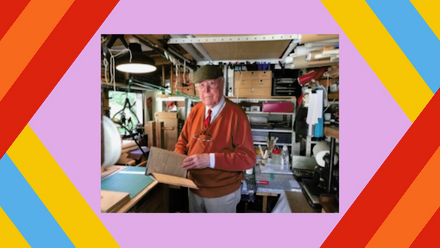Developing a Materials World – what’s next?
In the last of a series of articles, the team behind the UK’s collaborative Discover Materials initiative explore how we can raise awareness earlier in schools of Materials Science and Engineering as a discipline that offers many career opportunities.

This article was produced by: Mrs Amanda Southworth, ROSE (Recruitment, Outreach and Student Experience) Coordinator, The University of Sheffield; Dr Kathryn Downey, Outreach Officer, Department of Materials, The University of Manchester; Dr Eleonora D’Elia, Strategic Teaching Fellow, Imperial College London; Dr Chris Hamlett, Henry Royce National Outreach Officer for Materials Science and Engineering, Discover Materials and University of Birmingham.
Materials Science and Engineering (MSE) has its background in Physics, Chemistry, Maths and Biology, with elements of materials study running through the curriculum from Reception (Key Stage 1) all the way to A-Level (Key Stage 5). However, the student (and teaching) population still seem unaware of exactly what MSE is and therefore the desire to study it is not being discovered until much later in a student’s education life-cycle. So, how can we change this?
In our previous two articles published in Materials World, entitled Developing a Materials World – why (not) us? (March 2021) and Developing a Materials World – what do students think? (May 2021), we looked at the routes that students take to the first year of an MSE undergraduate degree, what drives them to study at university and the perceptions of MSE as a subject among 16-18-year-olds.
We found that MSE is often poorly represented in terms of Higher Education Classification of Subjects (HECoS) codes, which may lead to it being overlooked in some Universities and Colleges Admission Service (UCAS) searches and be under-represented in university course statistics.
Interestingly, a higher proportion of the first-year cohort on MSE courses is made up of students transferring from other courses at a given institution rather than direct entry, in comparison to other science and engineering courses. This suggests that the students may only be aware of MSE courses once they are at university, at which point they see it as an attractive degree. A similar finding was highlighted when we surveyed 16-18-year-olds – a significant proportion declared they would be more likely to study it at undergraduate level, when they knew what it was.
This highlighted the need to make school students more aware of MSE and how this can be achieved by building an inclusive community to help promote awareness within both primary and secondary schools and the wider public.
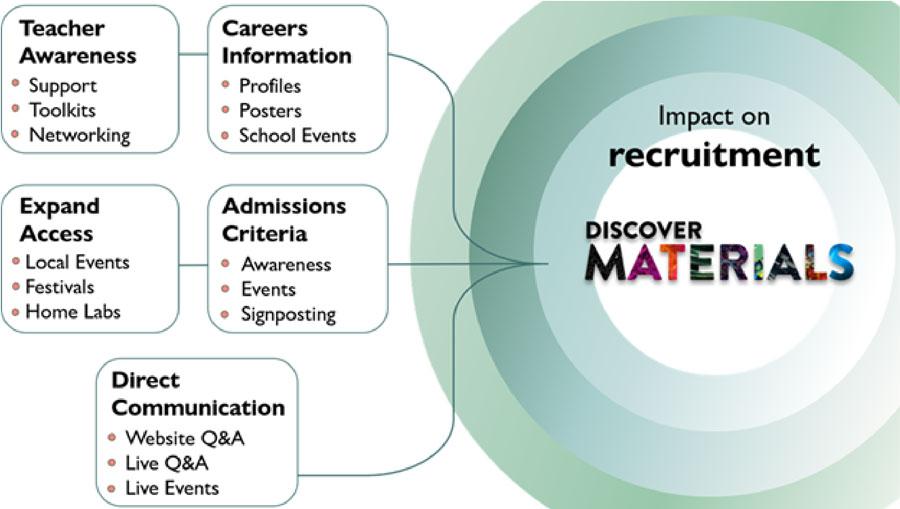
Curriculum and careers
Increasing the awareness of Materials Science to school students during their education and beyond is critical in appreciating the relevance of the subject and considering a potential career in the area.
Interestingly, MSE is referred to in both Key Stages 1 and 2 of the national UK curriculum, but is then neglected in subsequent Key Stages. The current A-Level syllabus only contains one section of materials content, including Young’s Modulus, Hooke’s Law, tensile stress, density and other basic properties of materials, as part of the Physics curriculum. In the GCSE syllabus, there are no specific references to materials, however, the aims and learning outcomes clearly state, ‘GCSE study in Physics provides the foundation for understanding the material world’. This indicates an assumption that students know they are being taught about Materials Science, however, through our aforementioned surveys we found this was not the case, even with current MSE students, as reported in our previous article.
It remains difficult to identify where in the Key Stage 3 curriculum a clear link to Materials Science is established. This is problematic as without a link to the learning objectives or aims, teachers are required to independently make this connection to emphasise the relevance of the learning to Materials Science, which requires a broader awareness that we should not assume when designing curricula.
School students are often unaware of the fantastic career opportunities a MSE degree can open. They are aware of what established pure science and engineering degrees can offer for career and employment, but the suggestion of MSE as a pathway will often elicit doubt or a perception that it is too specialised a discipline. The scope of a MSE degree continues to be poorly appreciated, which is understandable considering the continued public misperceptions of the roles of scientists and engineers in our society, primary and secondary schools and the wider public.
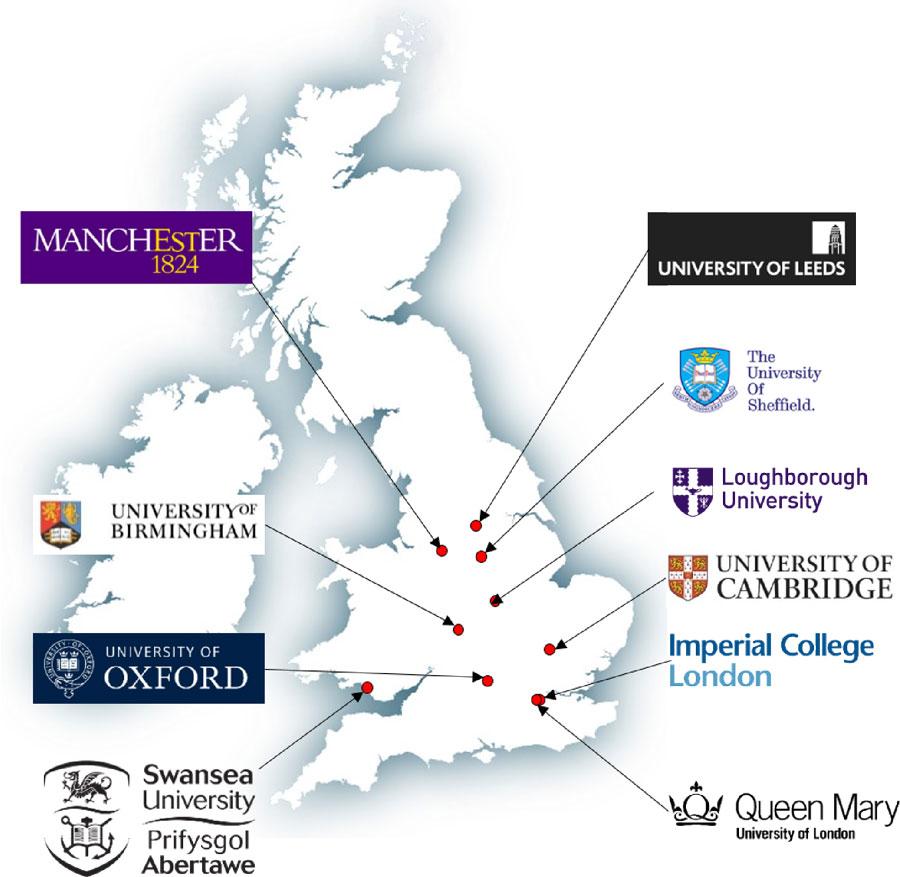
Discover Materials
The Discover Materials working group was formed in 2017 by the Heads of Materials Departments at nine UK universities to promote MSE as a discipline, with the University of Leeds joining the group in 2020. In 2019, a National Outreach Officer for MSE was appointed, supported by the Henry Royce Institute for advanced materials (Royce), to coordinate the outreach activities across the group. An advisory board has recently been appointed to help us deliver our objectives effectively and includes representation from teachers, exam boards, outreach experts, academia and industry.
Discover Materials aims to make school students aware of MSE at a much earlier stage in their education – both the subject itself and related careers. There is a shortage of materials scientists in the industrial workforce. By promoting this diverse scientific discipline in the national curricula and targeting key influencers, like educators and families, we aim to promote it and the rewarding career paths to increase the diversity and breadth of expertise in the workforce.
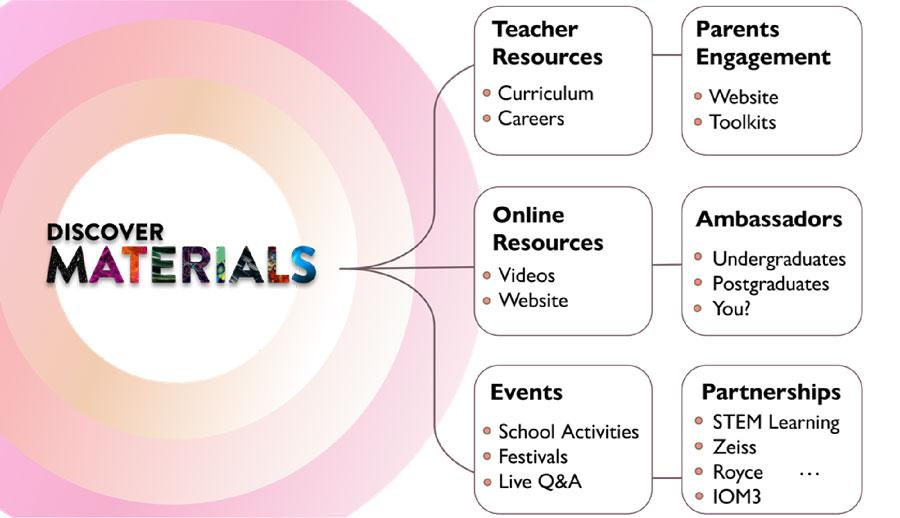
Engaging the audience
We will provide both online resources (such as ‘in class’ and ‘at home’ activities) and in-person activities (such as school visits and festivals). These will be delivered by our Discover Materials Ambassadors (DMAs) who will also help develop new resources.
We have created a new website (see link at the end of this article), supported by Royce and aimed at school students, teachers and families to help them identify what MSE is and where it can be used in the classroom, at home and, more importantly, in the syllabus by providing a blend of resources developed by the working group and ambassadors and signposting high quality content already available online. The website will explore the world of MSE, careers information and new developments, as well as upcoming events and museum exhibits.
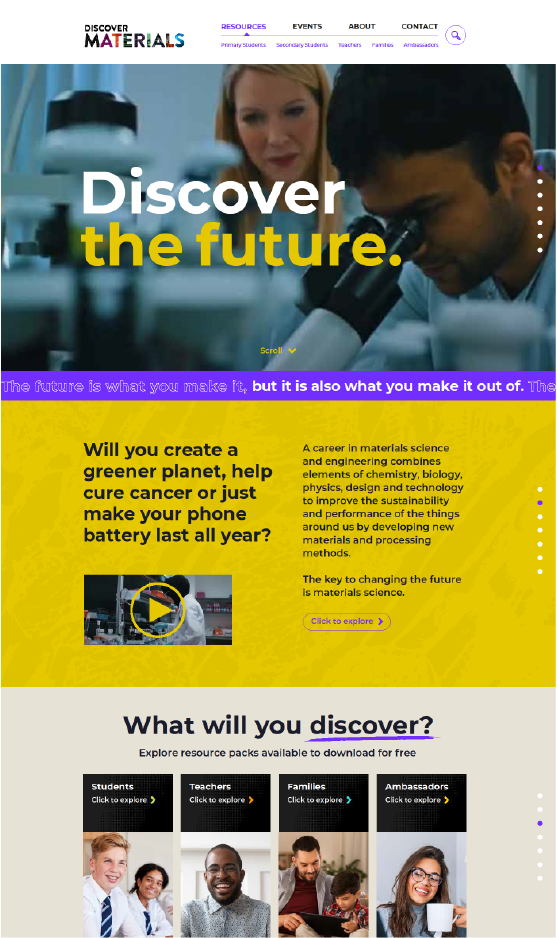
An important part of building this awareness has been to develop a portfolio of posters featuring alumni from across the Discover Materials institutions to highlight the broad spectrum of career pathways and showcase a range of role models. These will be freely available on our website capturing students' curiosity as well as the public's imagination. Our DMAs will have a website profile, recognising their contributions, and access to training and support and high-quality outreach equipment (for example portable tensile tester and thermal imaging cameras), as well as networking opportunities and information on how to join the Discover Materials community.
We aim to work with existing outreach schemes like Making Materials Matter (run by the University of Cambridge, Imperial College London, University of Oxford and University of Sheffield), which engages Year 8 students from disadvantaged areas to work with researchers on solving real-world problems. As part of this programme, teachers are invited to professional development days to network and share learnings about MSE.
We are working with other partners, such as STEM Learning, to create and deliver resources that help publicise the DMA scheme to their ambassadors; Zeiss to develop online resources; and also IOM3. Diane Aston, Head of Education and Professional Development at IOM3, will provide the DMAs with IOM3 Discovery Boxes and appropriate training to deliver outreach sessions at schools. Diane says, ‘Encouraging young people into materials, minerals and mining careers is crucial for the sustainability of our industries and IOM3 has been working hard to support the teaching of our disciplines in 5-19 education and promote careers for over 20 years. The Discover Materials initiative is a fantastic way of pulling the materials community together with the common aim of securing our future, and we are thrilled to be working alongside the Henry Royce Institute and others to support this vital work.’
Establishing both the website and DMA network will allow us to engage our target audiences in a coordinated manner. The website will continue to grow and evolve allowing visitors to delve into the world of MSE.
Our articles have indicated that there is a great deal of work still to be done and we need to collaborate with partners on projects and initiatives to increase awareness and visibility of MSE. It is important for students to be introduced to MSE early in school and vital that we empower teachers to deliver exciting lessons that highlight the relevance of MSE in the curriculum.
Come and work with us to inspire the next generation and increase the public visibility of this fantastic field by contacting us at [email protected] and visiting www.discovermaterials.uk.



